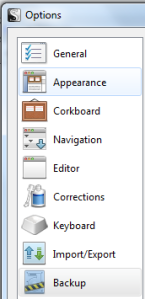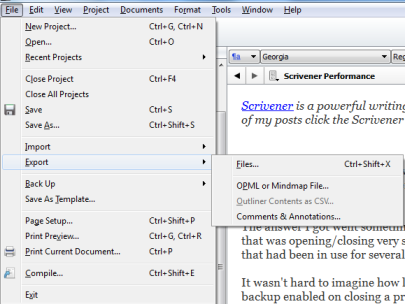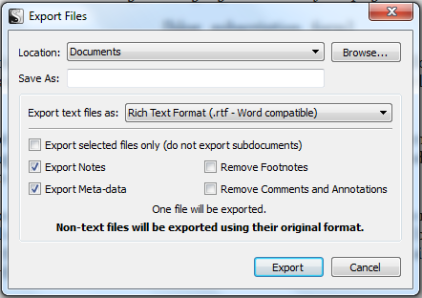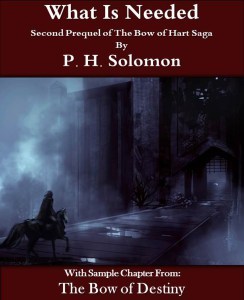Scrivener Project Management: Don’t Let the Beast Loose
Scrivener is a powerful writing tool. I write about it weekly with tips and usage ideas. To read more of my posts click the Scrivener tag or category at the end of the page.
Follow Blog via Email
Enter your email address to follow this blog and receive notifications of new posts by email.
 Keep track of a project at any time can be difficult. If your not able to do so things can become a monstrous mess that can consume the good intentions behind your goals. The same is true of managing a project in Scrivener. So let’s take a look at one way to keep a lid on the beast of disorganization and it consequences.
Keep track of a project at any time can be difficult. If your not able to do so things can become a monstrous mess that can consume the good intentions behind your goals. The same is true of managing a project in Scrivener. So let’s take a look at one way to keep a lid on the beast of disorganization and it consequences.
I got an interesting question a while back so I’m addressing it today. A follower on Twitter asked about performance issues with Scrivener. It was a rather general question so I followed up by asking for more details.
The answer I got went something like this: the person asking about performance issues had a project that was opening/closing very slowly. A little further explanation indicated that the project was one that had been in use for several years with daily input during that time.
 It wasn’t hard to imagine how large the project had gotten and there’s the rub. If you still have auto backup enabled on closing a project (recommended) then the project will backup and close once you exit. The larger the project, the longer the backup will take. Opening is a similar story sans the backup. Also, the larger the project the more computer resources will be used.
It wasn’t hard to imagine how large the project had gotten and there’s the rub. If you still have auto backup enabled on closing a project (recommended) then the project will backup and close once you exit. The larger the project, the longer the backup will take. Opening is a similar story sans the backup. Also, the larger the project the more computer resources will be used.
Here’s a personal feeling about this issue so take it for it’s worth. I wouldn’t recommend using a project for daily work that stretches for years – it will just get too big to open and I can imagine it would be cumbersome to manage as well. Personally, I have a few projects that I’m using throughout the year such as those for blog posts and newsletters. However, I intend to close these out at the end of the year and create new projects for these purposes in 2016. That way they are easy to manage and don’t get too large. Most projects aren’t used this way – such as a book – which will eventually be completed.
So what do you do if you have such a problem? Easy! Export older or new content (depends on how you want to do it) out of the project and then import said data back into a new project. This means that you are essentially going to split the project. Make sure to take a snapshot beforehand as well as having a backup to which you can revert (check your backup folder which is in your Options by clicking on Tools => Options => Backup, click the button to open the backup folder). Once you’ve confirmed you’ve exported and imported the data successfully you can trash what you exported out of the old project. After that, if you’re still having performance issues, contact Literature and Latte for more assistance.
To export, select all the folders or documents you want to export in the Binder. Next, click File, slide to Export and click Files on the fly-out menu. There are options to choose such as the location & name of the folder where you are putting your data. There are other options showing but for these purposes only choose “Export Notes” & “Export Meta-data” since the other check-boxes will exclude data/content that you will likely want to retain.
Importing takes a bit more effort. Before importing, assess what you are doing to know how complex the work will be. You must import individual files into specific folders if you want to retain your folder structure. First, create your new project and duplicate your folder structure to your satisfaction.
To import, choose the folder into which you will import and click File, slide to Import and choose Files to navigate to the location where you just exported. You must navigate to individual files so select all the files in each folder and all the content will be imported into the specific folder you already selected. If you haven’t made your folder structure too complex it shouldn’t take forever, otherwise it may take some time.
I hope this helps you iron out any performance issues you may have as well as manage a project that has grown in size or complexity.
Please share your thoughts and ideas in the comments section. Sign up for my Archer’s Aim Digest mailing list to receive the forthcoming edition of my newsletter with announcements about upcoming releases and events (this months volume has already gone out). Want to be listed in The Bow of Destiny credits? Join the Street Team to share upcoming links. Either way, you’ll be the first to have news about my books, especially some free offers this summer related to the upcoming release of The Bow of Destiny, the first novel of The Bow of Hart Saga. Anyone who reserves a copy by 8/7 on Barnes & Noble, or iBooks (via the iTunes app) and emails me the screen-shot of the order will also receive a free coupon to download my e-book short story, The Black Bag containing a sample chapter of The Bow of Destiny. Additionally, August’s free e-book: Trading Knives is available on Kobo, iBooks, Smashwords, Barnes & Noble & Amazon. September’s FREE book is currently available on Smashwords and pending elsewhere.
Follow Blog via Email
Enter your email address to follow this blog and receive notifications of new posts by email.
Just as a note: I now have a marketing affiliation with Scrivener. For support questions, pricing, licensing and other concerns please contact the vendor. As such a buy ad for Scrivener appears on the sidebar. I’ve started this program since I like the product so much and want to offer readers the chance to obtain this software. I’m not required to write about Scrivener to be an affiliate; I just like it that much. You can also find my FTC statement on this site’s sidebar.
Filed under: Blogging, Creativity, Editing, Fantasy, Indie Publishing, Mailing List, Marketing, Pinterest, Planning, Pre-order, Scrivener, Self-publishing, Short Fiction, Short Stories, Smashwords, Social Media, Tech Tips, The Black Bag, The Bow of Destiny, The Bow of Hart Saga, Tips, Trading Knives, Twitter, Wattpad, What is Needed, Writing Tagged: Amazon, Barnes and Noble, blogging, creativity, Editing, Facebook, Fantasy Fiction, Indie Publishing, Marketing, P. H. Solomon, Pinterest, Planning, Scrivener, Self-publishing, Short Stories, Smashwords, Social Media, The Black Bag, The Bow of Destiny, The Bow of Hart Saga, Tips, Trading Knives, Twitter, What is Needed, writing
















